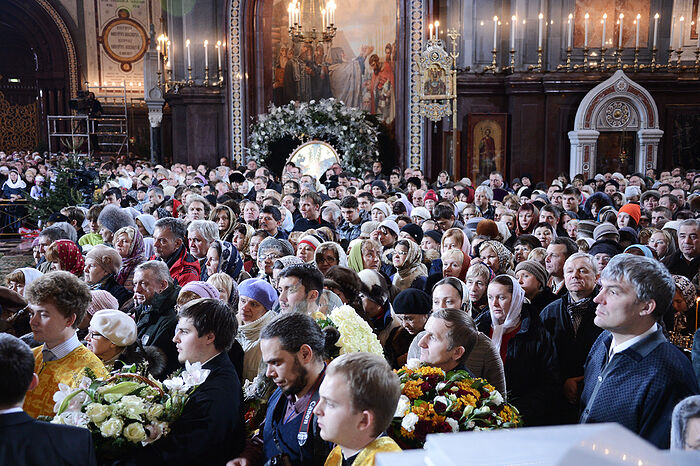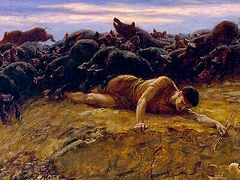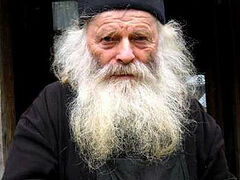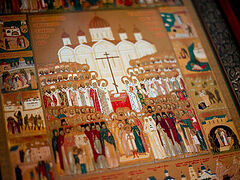And Jesus went forth, and saw a great multitude, and was moved with compassion toward them, and He healed their sick (Mt. 14:14).
Every page of the Gospel reminds us, brethren, of some picture from modern life. Thus, in today’s Gospel it says that once, when the Lord was in the desert, a host of people came to Him and listened to His teachings all day, forgetting about all their bodily cares. And the Lord miraculously sated these people who had already been spiritually sated by His teaching, and healed the bodily infirmities of those who had already been spiritually healed through His word. Does not this gathering in the desert of people who desired to listen to the Lord remind us, brethren, of our gatherings in this church, where we seek spiritual edification? After our everyday labors and cares exhaust and weaken our souls, we make haste to come here on the day of the Lord to satisfy our spiritual hunger through hearing the hymns and Church readings, composed by men who had rich treasures of theology and spiritual edification in their souls; through hearing and watching everything that happens here, and what we see here in all those who have gathered.
Blessed, brethren, are all those of us who haven’t lost the ability to satisfy the hunger of our souls through hearing the word of God and the prayers of the Church, who willingly hurry here according to the commandment of the Lord and the Apostles. They are likened, according to the word of the Lord, unto a wise man, which built his house upon a rock. And the rain descended, and the floods came, and the winds blew, and beat upon that house; and it fell not: for it was founded upon a rock (Mt. 7:24-25).
But there’s another type of people—and there are quite a number of them in our land—who seek to satisfy the persistent higher demands of the soul not with the word of God and not with prayerful ascension of the soul to God, but only with that which they see on earth and what the mind can explore without going beyond the limits of the observation of earthly objects. Calling themselves intelligent people, primarily called to the search for truth and to guiding the life of the people, they accuse Christianity, saying that contrary to the structure of human nature, which consists of spirit and body, it seems to completely detach man from real, earthly life, and makes him neglect all those victories of the human mind in the arts and sciences, in the realm of material phenomena, and which have always constituted his happiness and glory. But that which constitutes the greatness and glory of Christianity, which to this day, in an age of extreme decline of love for God and understanding of the spiritual life, continues to overcome blind attachment to corruptible matter and to fill all kinds of human wisdom with a living soul—making it truly valuable—upbraids and reproaches such people!
Some of the relatively few who have deviated from the understanding of the Church started engaging strange arguments about the “sanctity of the flesh” (Rozanov, Merezhkovsky), and some radicals (followers of Nietzsche) began to proclaim that the only true meaning of human existence should be sought on earth.
Let’s not harshly condemn such seekers of truth who haven’t truly lost consciousness of the difference between good and evil and are truly seekers of truth—though they’re mistaken. We’ll point out just one circumstance, namely that in calling themselves seekers of truth, they never feel complete peace of mind, even less so of the heart; that the further time goes on, the more they lose hope of finding the truth and begin to consider their calling not to recreate life according to their own ideals, but only to agonize over the resolution of this question about the meaning of life, which they can’t resolve.
This disposition can be seen in many people, derived from some modern Russian writers (Boborykin, Gorky, etc.). But even more lamentable is the fate of those who, having lost all faith in the existence of God and in the practicability of any higher needs of the spirit on Earth, see nothing above and beyond the Earth, derisively calling all this “high matters.” The sad fate of Nietzsche, which has befallen and is befalling so many in the form of extreme nervous and mental derangement recently, apparently should have long served as a warning for such people and a reminder of the truth of Christ’s words, that every one that heareth these sayings of Mine, and doeth them not, shall be likened unto a foolish man, which built his house upon the sand (Mt. 7:26), and this house couldn’t withstand the rush of the storms and the adversities of life.
Therefore, brethren, let us not spend money for that which is not bread and [our] labour for that which satisfieth not (Is. 55:2)! Let us taste the good word of God and taste of the Heavenly gift (Heb. 6:4-5), remembering the words of the Lord: He that cometh to Me shall never hunger; and he that believeth on Me shall never thirst (Jn. 6:35). Let those who, calling themselves intelligent, Labour … for the meat which perisheth (Jn. 6:27), and want that the heart be established not with grace, but with meats (cf. Heb. 13:9), and reduce the whole meaning of their teaching to this, be many more than us, the devoted children of the Church, but let us remember that greater is He that is in you, than he that is in the world (1 Jn. 4:4). He that is unjust, let him be unjust still: and he which is filthy, let him be filthy still: and he that is righteous, let him be righteous still: and he that is holy, let him be holy still, according to the word of the angel spoken to the seer of the future destinies of the world, St. John the Theologian (Rev. 22:11). And until Christ has come to judge the world and reward each according to his deeds, let us fulfill what the Lord Jesus Christ commanded us through the Gospel and the Apostolic writings, to testify … in the churches: Let him that heareth say, Come. And let him that is athirst come. And whosoever will, let him take the water of life freely (Rev. 22:16-17).
Amen.




